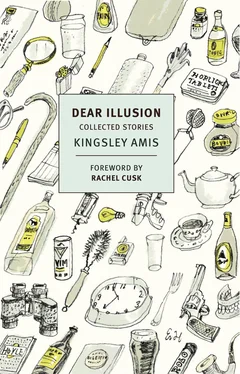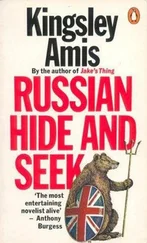II
‘Anything special for me this morning, Wilf?’ Major Raleigh hung up his service-dress hat — which, in defiance of his own edict, he regularly wore with battledress — on the fist-sized bronze knob of the bookcase door. Behind the glass of this, apart from a couple of dozen battered books in a foreign language or two, there huddled a heap of painted china vases and ewers which the major thought might be eighteenth century or nineteenth century or one of those. He had collected them from various houses and shops in the area and sometimes wondered what to do with them.
Captain Cleaver looked listlessly at a pad on his table. ‘I don’t think so, Major. There’s the pay to collect.’
‘Get one of the cable wallahs to go. Time they did something to earn their living.’
‘Well, it’s a trip, you know, Major.’
‘So much the better.’
‘No, I was thinking somebody might like to go. Get out of the place for a bit.’
‘Oh, I see what you mean. Go yourself if you like, Wilf.’
‘Well, actually I was hoping to look in at the Officers’ Shop if you’re not going to need me here. That’s in the opposite direction to the cashier.’
‘Ask that parachute chap, then, Pinch or Finch or whatever his name is. He’s been looking a bit down in the mouth.’
‘Winch. Yes, he has, hasn’t he? He must feel a bit of a fish out of water here. Nothing going on. It must have been a bit different at Arnhem. All that excitement. Pretty hectic too, though. I expect he misses that, don’t you?’
‘What?’ The major, at his in-tray, stared up over his reading glasses. They made him look ineffectively studious, like a neglected schoolboy at a crammer’s. ‘Misses what?’
‘You know, the excitement and the big bangs and so on at Arnhem. I was asking you if you thought he was missing it.’
‘Who?’
‘Winch, the parachute chap.’
‘How the hell should I know what he’s missing and what he isn’t missing? And he wasn’t at Arnhem, I asked him. Got taken off the drop at the last minute because of dysentery.’
‘I understood him to say—’
‘He wasn’t on the Normandy drop, either.’
‘Well, he wouldn’t have been, would he? Normandy was Sixth Airborne. Arnhem was First.’
‘Yes. Look, Wilf, if you’re going to the Officers’ Shop there are a couple of things you might pick up for me, if you would.’
‘Certainly, Major, of course.’ Cleaver turned to a fresh page of his pad, pleased at the chance of writing something down, and poised his pencil devotedly. ‘Now then, what can I do for you?’
‘Half a dozen handkerchiefs, the silk ones. Don’t seem to be able to get anything ironed round here. Three pairs of the lightweight socks, size eight shoe. Not the elastic tops. If there’s only the elastic tops don’t get anything. Ties? No, I’m all right for those.’
The major appeared to fall into a muse. Cleaver said: ‘Anything else, Major?’
‘Hold on, I’m thinking… Those American shirts. Has he got any left, do you know?’
‘Well, he’s probably got some more in by this time. He said he was getting some more in.’
‘Make sure they’re the same. The same as I’m wearing now. See?… You’re not looking.’
‘I am, honestly, sir. I know the sort.’
‘Make sure the collar’s the same. Get me three of them. Fifteen and a half neck.’
‘Right.’
‘Just a moment.’ The major fondled his throat, his blue eyes bulging as he tried to see what he was doing. ‘Better say sixteen to be on the safe side. I’ll settle up with you when you see what you’ve got, okay?’
‘Right, Major. Oh, by the way, I meant to tell you—’
‘What?’
‘A message came over the blower from Movement Control in Hildesfeld. Just an advance warning — there’ll be a teleprint through this afternoon with all the griff. A platoon of the Montgomeryshire Light Infantry are moving into the area some time tomorrow and we’re to help them find accommodation. They were supposed to be doing guard duty at one of the DP camps, but it closed down a couple of days ago and so there’s nowhere for them to—’
‘But it’s not our responsibility to fix them up. They’re not Signals.’ Raleigh spoke with an anxious severity, as if, conceivably, the platoon referred to might turn out to be the one in which someone very dangerous to him was serving, someone who had seen him cheating at picquet or torturing a prisoner.
‘I know, but that’s not what they’re on about. These people will come under the Admin Company in the ordinary way. It’s just that — well, the Staff Captain in Hildesfeld seemed to think that with our knowledge of the area we could be pretty useful to these MLI types. Know where to look and save them time. Just lend them an officer and a sergeant for a day or so. Nobody at Movement Control who’d do and if there were they couldn’t spare him. They’re run off their feet there.’
The major hardly heard the last part of this. In the weeks since the war ended, even more since the larger part of the unit had gone to Potsdam, he had been possessed and tormented by dreams of triumph, renown or at least advancement. One of these, which he never visualized with full conscious attention, was about a local Nazi uprising crushed by him in a single prompt and ruthless blow. Another, disguised as an unuttered joke, involved the removal with ignominy of the CO as a chief executive of communications at Potsdam and the immediate substitution of himself: ‘Where’s Raleigh? Get hold of Raleigh. There’s only one man for this job and that’s Dick Raleigh.’
Dreams three and four engaged him more continuously, if less profoundly. Three he had taken what steps he could to bring to life. In the last month he had written three demi-official memoranda to the Signals general at Army Group headquarters. Their theme was that, if the war against Japan lasted long enough, there would probably be a role in it for a new full-dress Headquarters Signals unit, and that the body of troops at present under his command, admittedly miscellaneous but in a high state of training, could with advantage be used as the basis of such a unit. He himself, he had pleaded, could ask for nothing better than to stay on in uniform past the date of his expected release, indeed indefinitely, if he could be allowed to serve as its leader.
The first memorandum had been acknowledged with the utmost formality, the others not at all. As each day brought no word from Army Group HQ, and as news of Japanese reverses mounted, the major fell back increasingly on his fourth dream. This had been put into his head by the compulsions of military geography. The medium-sized village in which he and his men were living had turned out to lie within administrative reach of a smallish but important railhead — the one at Hildesfeld. The Movement Control people there were faced with the task of propelling personnel westward about three times faster than their resources allowed. The accumulating residue had to be put somewhere. The major’s village and its environs were an obvious lodgment for it. The major had taken it upon himself to provide communications between the railhead and the tankless tank troops, the gunless artillery sections, the reconnaissance detachments with nothing in Europe left to reconnoitre — all those whom destiny or administrative whim had transmitted in this general direction.
If this situation continued, authority would have to recognize it. A different type of man from the major might have noticed an analogy with the experiences of an ex-colonial territory on the threshold of statehood. As things were he simply saw himself as an Area Commandant with a lieutenant-colonelcy to match. Only one officer of this rank was known to be living hereabouts, a youthful Engineer on twenty-four-hour warning of departure who was rumoured to divide his time between drinking schnapps in a farmhouse bedroom and driving round the countryside looking for more, this at a speed which suggested that death might remove him before officialdom could. Of the five or six local majors, inquiry showed that Raleigh was senior to three and had been around the place longer than any. ‘Lieut-Col. R. W. Raleigh, R Sigs’ sounded authentic. So did ‘Winkworth (West) Conservative Association — Chairman : Colonel Richard W. Raleigh’.
Читать дальше












